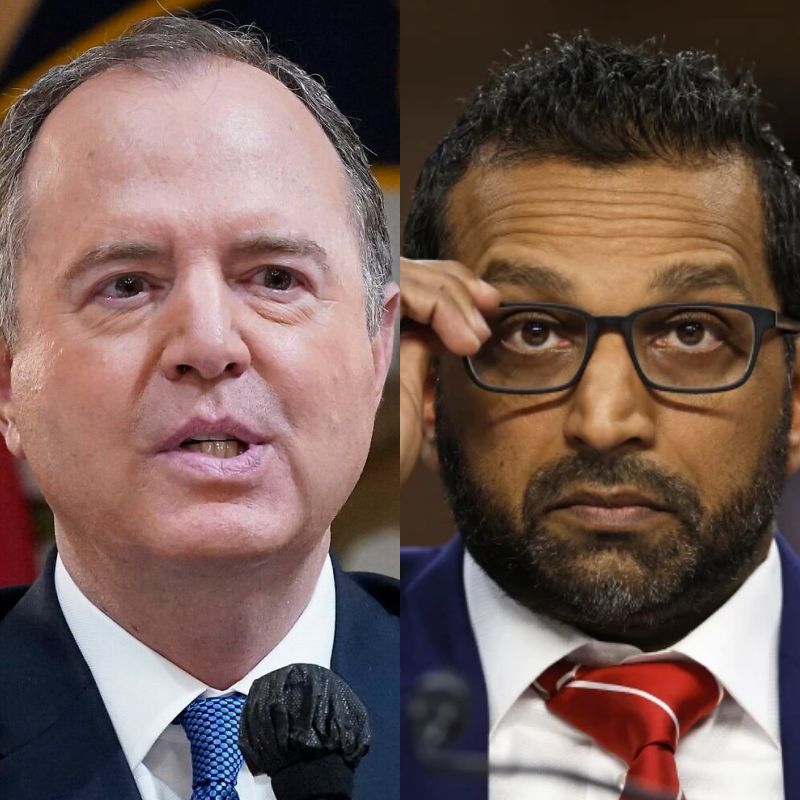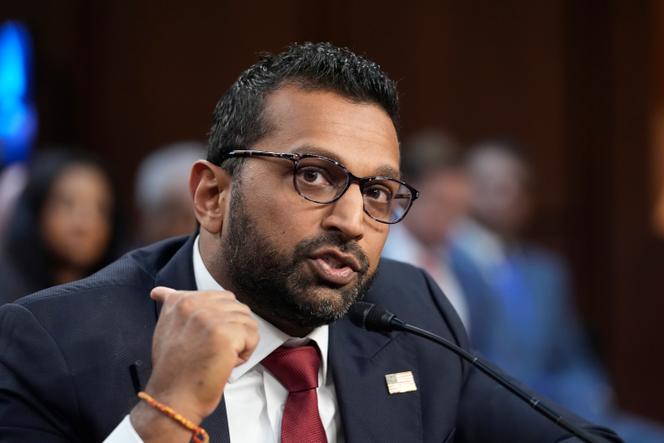Adam Schiff’s Arrogant Insult Backfires on Kash Patel—You Won’t Believe His Epic Response!
Adam Schiff’s Arrogant Insult Backfires on Kash Patel—You Won’t Believe His Epic Response!
Adam Schiff’s Senate Meltdown: Kash Patel’s Evidence Turns Routine Hearing Into Historic Political Downfall
The Hart Senate Office Building has seen its share of dramatic hearings, but none quite like the one that unfolded yesterday. Senator Adam Schiff, long regarded as a master of political theater, found himself cast not as the prosecutor but as the defendant—his reputation, career, and legacy on trial before the nation.

It began as a routine oversight hearing on the FBI’s budget request. The chamber was packed beyond capacity, with C-SPAN cameras rolling and photographers jostling for the best shot. July’s sweltering heat pressed against the marble walls, but inside, the tension was thick enough to cut with a knife.
Kash Patel, six months into his tenure as FBI Director, sat calmly at the witness table. Schiff, armed with 23 meticulously prepared binders, was ready for war. His staff called their strategy “the killbox”—a systematic destruction of Patel’s credibility, meant to paint him as a political hack and Trump loyalist bent on dismantling the Bureau from within.
But Schiff’s opening salvo—an accusation of a “political purge” at the FBI—was met with Patel’s unflinching reply: “Political purge, Senator? I’ve removed 12 agents. Would you like to know why?” What followed was a litany of damning revelations: agents selling classified information to Beijing, leaking secrets to the media for cash, fabricating evidence in federal investigations. Patel produced signed confessions and wire transfer records, laying them out before the stunned committee like a dealer revealing a royal flush.
The hearing room fell silent. Schiff, visibly rattled, tried to regain control, but Patel’s evidence was overwhelming. “One of them mentions you by name, Senator,” Patel said, his voice measured. “Shall we discuss that?” In an instant, the routine oversight hearing had become Schiff’s worst nightmare.
As the revelations mounted, the committee’s mood shifted from combative to incredulous. Patel detailed how Agent Patricia Coleman had received $200,000 from the Chinese Communist Party, complete with wire transfer receipts and classified program details sold to Beijing. He described another agent’s $50,000 in “consulting fees” from CNN, coinciding with exclusive stories about ongoing FBI operations. Each fact was backed by documents, each accusation more specific and devastating than the last.
Schiff’s defense—claims of whistleblowers and legitimate donations—crumbled under Patel’s relentless presentation. “Whistleblowers don’t get paid by media companies, Senator,” Patel said. “They also don’t selectively leak only to outlets that donate to specific political campaigns. Your campaigns specifically.” The accusation landed like a bomb.

Patel continued, exposing fabricated evidence in FISA applications, naming Schiff as the recommender for all three disgraced agents. “Your signature is on their recommendation letters,” Patel said, producing the documents one by one. Schiff’s confidence gave way to confusion, then fear, as his own words were used against him.
Desperate to change the subject, Schiff tried to steer the hearing toward new FBI protocols, but Patel was ready. “We’ve implemented total transparency protocols. Every FISA application filed by the FBI is now public after 90 days. No exceptions.” Schiff sputtered about exposing sources and methods, but Patel had anticipated every move, countering with evidence of Schiff’s own urgent unmasking requests—37 in total—targeting Trump campaign officials.
The room was spellbound as Patel read the names: George Papadopoulos, Carter Page, Michael Flynn. Each was unmasked by Schiff, each suffered public ruin despite exonerating evidence. “You leaked their names to the press. You destroyed their lives. For politics, Senator, for pure partisan politics,” Patel said, his voice dropping to a whisper that forced everyone to lean in.
Schiff denied wrongdoing, but Patel’s specificity was overwhelming. He recounted a dinner between Schiff and CNN reporter Manu Raju—the ribeye, the salmon, the $347 bill paid with Schiff’s campaign-linked Platinum American Express. The next day, CNN ran a leaked story about the Steele dossier. Patel offered to show the committee the credit card receipt and text messages confirming the leak.
The coup de grâce came with the release of the Epstein files. Patel revealed Schiff’s formal requests to redact the names of donors and convicted criminals—Ed Buck, Harvey Weinstein, Anthony Weiner, Clare Bronman. Each name brought new revelations of campaign donations and personal notes from Schiff, each tied to scandals and crimes. “You took his money twice, Senator, after both murders,” Patel said of Buck.
The hearing became a spectacle. Schiff’s colleagues shifted uncomfortably, some Democrats fled the room, unwilling to be associated with the unfolding disaster. Patel continued, revealing Schiff’s role in leaking the Mar-a-Lago raid to CNN, fabricating evidence for the January 6th investigation, and coordinating with whistleblowers whose complaints were drafted on Schiff’s own Senate computer.
The evidence was damning. Patel produced forensic analyses from independent firms, visitor logs, wire transfers, and text messages. He detailed how Schiff’s staff coordinated with Eric Chiaramela, the Ukraine whistleblower, and how campaign funds were funneled for “opposition research.” Patel offered to play recordings of Schiff’s meetings, obtained through the whistleblower’s cooperation and full immunity.
Schiff tried to rally his Democratic colleagues, but none would meet his eyes. Senator Warren, Senator Schumer, and Senator Feinstein offered only neutral statements about reviewing the evidence. One by one, they abandoned him. Schiff was left alone, his staff resigning en masse, his communications director quitting on the spot.
Outside, reporters swarmed, demanding answers. Schiff, once eloquent and unflappable, was mute, his face a mask of shock. Inside, Patel calmly resumed his testimony, requesting a 15% increase in counterintelligence funding. The budget was approved unanimously—even by Democrats eager to distance themselves from the scandal.
By evening, Schiff’s office was deserted, his staff packing boxes, phones ringing with demands for resignation. Twitter exploded with #SchiffExposed, video clips of his destruction going viral. His wife asked him not to come home, donors demanded their money back, and Democratic leadership called emergency meetings.

Within a week, Schiff was removed from his committee positions by unanimous vote. California Democrats began lining up to primary him. Major donors and speaking agencies dropped him, his book publisher postponed his memoir, and his wife left for New York. Protesters gathered outside his home, his approval ratings plummeted, and he entered the Senate through underground tunnels to avoid the public.
Six months later, Schiff announced his retirement, citing family time and private opportunities. Few believed the official story. His Wikipedia page was amended with a lengthy section on controversies and fabricated evidence. Law firms, lobbying groups, and cable networks wanted nothing to do with him. He moved to a smaller house, his wife filed for divorce, and his legacy was sealed—not as a defender of democracy, but as a cautionary tale of political corruption.
The final scene saw Patel briefing senators on FBI successes, the Bureau’s reputation slowly restored. Outside, the American flag waved—a symbol that, despite its flaws, the system had worked. Schiff would never see prison, but he would never wield power again. The truth had won, and in Washington, the loss of power was a fate worse than prison.
Adam Schiff, once a rising star, had become a political pariah—a reminder that, even in the swamp of DC, accountability can sometimes arrive.
Julia Stiles’ Iconic Roles: Why She’ll Always Be Hollywood’s Smart Girl Next Door

Julia Stiles is one of the most recognizable faces in Hollywood, known for her mix of fierce intelligence, emotional depth, and on-screen charisma. From her breakout roles in teen dramas to high-stakes action franchises, the variety in Julia Stiles movies and TV shows has kept fans captivated for decades. Whether you're reminiscing about classic early 2000s films or curious about her more recent work, this article explores her best performances and the legacy she's built in film and television.

Who Is Julia Stiles?
Before diving into her filmography, it’s worth learning a bit about Julia Stiles herself. Born in New York City in 1981, Julia began acting at the age of 11 with stage productions and quickly transitioned into film and TV. She attended Columbia University while acting professionally—a testament to her strong academic drive and work ethic.
Julia Stiles’ Breakout Role: 10 Things I Hate About You
The Movie That Launched a Generation
When we talk about Julia Stiles movies, it’s impossible not to begin with 10 Things I Hate About You (1999). A modern-day retelling of Shakespeare’s The Taming of the Shrew, this teen romantic comedy became a cult classic. Stiles played Kat Stratford, a fiercely independent and intelligent high schooler who refuses to play by society’s rules.
Her chemistry with the late Heath Ledger was unforgettable, and her iconic poem-reading scene still resonates with audiences today. The film helped solidify Julia as a leading lady of teen cinema.
Julia Stiles Dance Movie: Save the Last Dance
A Cultural Touchstone of the Early 2000s
One of the most frequently searched terms about the actress is "Julia Stiles dance movie"—and for good reason. Save the Last Dance (2001) remains one of her most beloved roles. She played Sara, a ballet dancer who moves to Chicago after her mother’s death and forms an unexpected bond through dance and love in a new high school.
This movie tackled issues of race, ambition, and identity while featuring incredible dance sequences. Julia’s performance was both emotionally raw and physically impressive, and it showed a new dimension of her acting capabilities.
Expanding Her Range: The Bourne Franchise
Julia Stiles in Action-Packed Thrillers
While many remember her for romantic dramas, Julia Stiles movies and TV shows also include high-octane thrillers like the Bourne series. She played Nicky Parsons, a CIA operative entangled in the mystery surrounding Jason Bourne, played by Matt Damon.
From The Bourne Identity (2002) to Jason Bourne (2016), her character evolved from a minor role to someone pivotal in the franchise. These films not only proved her versatility but also introduced her to a broader, global audience.
Underrated Gems and Indie Films
Exploring Julia Stiles’ Indie Side
Julia Stiles has never shied away from smaller, character-driven films. Some underrated Julia Stiles movies worth checking out include:
-
The Business of Strangers (2001) – A psychological drama where Stiles stars opposite Stockard Channing.
-
Mona Lisa Smile (2003) – A period drama with Julia Roberts, where Stiles plays a Wellesley student conflicted between tradition and ambition.
-
The Prince and Me (2004) – A romantic comedy that added a fairy tale touch to her career portfolio.
Each of these films showcases her ability to shift genres seamlessly while maintaining a powerful screen presence.
Julia Stiles on Television: Recent Projects
Returning to the Small Screen
While most fans focus on Julia Stiles movies, her recent television roles have been equally compelling. One standout performance is her lead role in the thriller series Riviera (2017–2020), where she plays an art curator thrown into the dangerous world of high finance and crime.
Stiles also appeared in Season 5 of Dexter (2010), earning critical praise for her portrayal of a trauma survivor with a dark side. These roles reaffirmed her acting depth and her ability to captivate audiences across formats.
What’s Next for Julia Stiles?
Julia Stiles continues to take on diverse roles both in front of and behind the camera. In recent interviews, she has expressed interest in directing and writing, showing her commitment to evolving in the industry.
Whether she’s dancing in Chicago, solving mysteries in CIA offices, or delivering Shakespearean monologues, Julia Stiles remains a force in Hollywood.
From 10 Things I Hate About You to Save the Last Dance and The Bourne franchise, Julia Stiles movies have left an indelible mark on multiple generations of fans. Her transition from teen icon to respected actress in complex roles shows her enduring appeal and undeniable talent.
Whether you're revisiting her iconic Julia Stiles dance movie, exploring her deeper indie projects, or watching her latest TV roles, there’s no denying that Julia Stiles continues to shape and redefine her legacy in the entertainment world.





